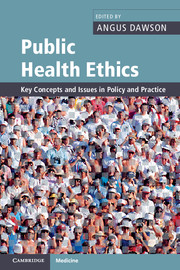Book contents
- Frontmatter
- Contents
- List of contributors
- Preface
- Acknowledgements
- Section 1 Concepts
- Section 2 Issues
- 5 Smoking, health and ethics
- 6 Infectious disease control
- 7 Population screening
- 8 Vaccination ethics
- 9 Environment, ethics and public health
- 10 Public health research ethics
- 11 Equity and population health
- 12 Health inequities
- Index
- References
7 - Population screening
Published online by Cambridge University Press: 05 July 2011
- Frontmatter
- Contents
- List of contributors
- Preface
- Acknowledgements
- Section 1 Concepts
- Section 2 Issues
- 5 Smoking, health and ethics
- 6 Infectious disease control
- 7 Population screening
- 8 Vaccination ethics
- 9 Environment, ethics and public health
- 10 Public health research ethics
- 11 Equity and population health
- 12 Health inequities
- Index
- References
Summary
Introduction
At first glance, the idea of examining a group of asymptomatic individuals for signs of disease or illness would appear laudable, even essential. Who would not want to try to prevent or provide early treatment for serious conditions such as cancer or HIV/AIDS? The screening tests involved are often minor, can significantly reduce morbidity and can even be life-saving. The myriad population screening programmes now in existence are underpinned by the rationale that screening can help optimize population health.
Yet issues such as impinging, however slightly, on people's liberty when offering a screening test mean that the introduction of this sort of health monitoring in populations should not be undertaken without careful factual and ethical analysis. Offering an unproven or ill-chosen test to an individual can have far-reaching implications for their future health care and well-being. Population screening may also conflict with valued ethical principles in health care, such as autonomy and consent. Ethical considerations arise with implications for health professionals, recipients and policy makers.
Conversely, the principles and frameworks for ethical analysis in a public health context (although methodologically uncertain) arguably differ from traditional analyses in medical ethics. It may be short-sighted to prioritize individual interests over those of society, as there are opportunities for rich ethical analysis in assessing the relative values of individual and collective interests in public health. Focusing on preventive medicine in asymptomatic populations raises the prospect of a collectivist ethic, in which communal life and the links that sustain it must be recognized (Jennings, 2007).
- Type
- Chapter
- Information
- Public Health EthicsKey Concepts and Issues in Policy and Practice, pp. 118 - 142Publisher: Cambridge University PressPrint publication year: 2011
References
- 6
- Cited by

